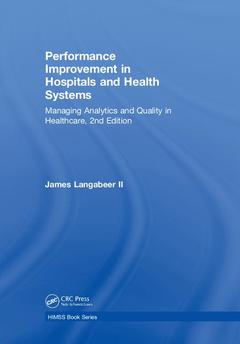Description
Performance Improvement in Hospitals and Health Systems (2nd Ed.)
Managing Analytics and Quality in Healthcare, 2nd Edition
HIMSS Book Series
Author: Langabeer II James
Language: English
Subjects for Performance Improvement in Hospitals and Health Systems:
Keywords
Performance Improvement Professionals; professionals; EHR; population; PHM; management; Performance Improvement Analysts; department; HIEs; electronic; Business Processes; record; Cpt Code; healthcare; ACOs; organizations; Healthcare Organizations; accountable; Performance Improvement Department; care; Business Case; James R; Langabeer; Performance Improvement; James Langabeer; Population Health; Osama Mikhail; National Academy; Rigoberto Delgado; Healthcare Providers; Kim Brant-Lucich; Donabedian Model; Jeffrey R; Helton; MIPS; Bobbie Kite; SPC; Tiffany Champagne-Langabeer; Chief Information Officers; Board Of Trustees; Population Health Analytics; Ceo; Population Health Initiatives; PCMH; Population Health Measures
Publication date: 03-2018
· 17.8x25.4 cm · Hardback
Publication date: 02-2018
· 17.8x25.4 cm · Paperback
Description
/li>Contents
/li>Readership
/li>Biography
/li>
Healthcare Organizations offer significant opportunities for change and improvement in their overall performance. Hospitals and clinics are generally large, complex, and inefficient, and need serious development in process workflow and management systems, which will ultimately lead to better patient and financial outcomes. The National Academy of Medicine has stated that hospital systems are broken, and that they must begin by "? improving hospital efficiency and patient flow, and using operational management methods and information technologies." In fact, costs and quality are two of the important aspects of the "triple aim" in healthcare.
One area that offers significant potential for improvement is through the application of performance improvement methods to patient and process flows. Performance improvement has a significant impact on a hospital?s over financial and strategic performance. Performance improvement involves the deployment of quantitative and scientific methods to model and influence the functioning of organizations. Performance improvement professionals are tasked with managing a variety of activities, such as deploying new information technologies, serving as project managers for construction events, re-engineering departmental process workflow, eliminating bottlenecks, and improving the flow and movement of patients between resource-intensive clinical areas. All of these are high risk, and require use of advanced, sophisticated methods to improve efficiency and quality, while minimizing disruptions from change.
This updated edition is a comprehensive and concise guide to performance improvement in healthcare. It describes the management engineering principles focused on designing optimal management and information systems and processes. Case studies and examples are integrated throughout all chapters.
Preface; Healthcare Leadership and Strategy; Organizational Performance Management; Analytics in Healthcare Improvement; Quality Management; Project Management and Change Management; Process Management and Re-engineering; Lean and Six Sigma; Organizational Behavior in Performance Improvement; Productivity Management; Evidence-Based Healthcare and Information Systems; Glossary of Key Terms
James Langabeer II, MBA, PhD is a Professor of Healthcare Management and Informatics at the University of Texas Health Science Center. He has served in hospital senior leadership at several renowned academic medical centers, led technology startup organizations through commercialization, provided management consulting to dozens of non-proft healthcare organizations, and is a seasoned researcher and professor. Dr. Langabeer has previously served as the national chair of the HIMSS Management Engineering Performance Improvement Committee, and was on the editorial board of their HIMSS Journal of Healthcare Information Management. He has published in nearly 80 academic journals and is the author of six books. He earned his PhD in Management Science from the University of Lancaster in England. He is also a Fellow of HIMSS and is a Fellow of the American College of Healthcare Executives (FACHE).




